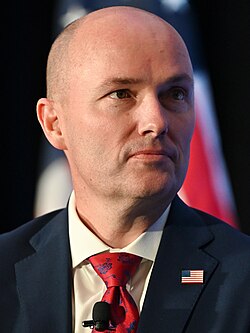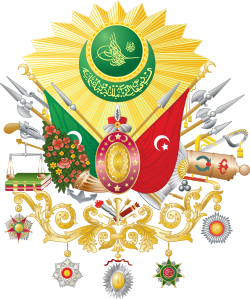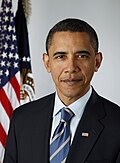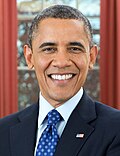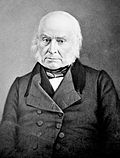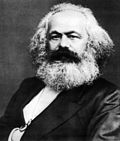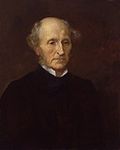Portal:Politics
| Main | Topics and categories | Tasks and projects |
The Politics portal
Politics (from Ancient Greek πολιτικά (politiká) 'affairs of the cities') is the set of activities that are associated with making decisions in groups, or other forms of power relations among individuals, such as the distribution of status or resources. The branch of social science that studies politics and government is referred to as political science.
Politics may be used positively in the context of a "political solution" which is compromising and non-violent, or descriptively as "the art or science of government", but the word often also carries a negative connotation. The concept has been defined in various ways, and different approaches have fundamentally differing views on whether it should be used extensively or in a limited way, empirically or normatively, and on whether conflict or co-operation is more essential to it.
A variety of methods are deployed in politics, which include promoting one's own political views among people, negotiation with other political subjects, making laws, and exercising internal and external force, including warfare against adversaries. Politics is exercised on a wide range of social levels, from clans and tribes of traditional societies, through modern local governments, companies and institutions up to sovereign states, to the international level.
In modern states, people often form political parties to represent their ideas. Members of a party often agree to take the same position on many issues and agree to support the same changes to law and the same leaders. An election is usually a competition between different parties.
A political system is a framework which defines acceptable political methods within a society. The history of political thought can be traced back to early antiquity, with seminal works such as Plato's Republic, Aristotle's Politics, Confucius's political manuscripts and Chanakya's Arthashastra. (Full article...)
Selected article

The 1975 Australian constitutional crisis, also known simply as the Dismissal, culminated on 11 November 1975 with the dismissal from office of the prime minister, Gough Whitlam of the Australian Labor Party (ALP), by Sir John Kerr, the governor-general who then commissioned the leader of the Opposition, Malcolm Fraser of the Liberal Party, as prime minister to hold a new election. It has been described as the greatest political and constitutional crisis in Australian history.
Featured picture

Aletta Jacobs (1854–1929) was a Dutch physician and women's suffrage activist. Jacobs strove throughout her life to change laws that limited women's access to equality, starting in 1883 with an unsuccessful court challenge and eventually achieving success on 18 September 1919, with the signing of a suffrage bill into law. In addition to her suffrage work she led campaigns aimed at deregulating prostitution, improving women's working conditions, and promoting peace.
Selected quote
Selected biography
Barack Obama (born August 4, 1961) is the 44th President of the United States. He is the first African American to hold the office. Born in Honolulu, Hawaii, Obama is a graduate of Columbia University and Harvard Law School, where he was president of the Harvard Law Review. He served three terms representing the 13th District in the Illinois Senate from 1997 to 2004, running unsuccessfully for the United States House of Representatives in 2000. He began his presidential campaign in 2007, and in 2008, after a close primary campaign against Hillary Clinton, he won sufficient delegates in the Democratic party primaries to receive the presidential nomination. He then defeated Republican nominee John McCain in the general election, and was inaugurated as president on January 20, 2009. Nine months later, Obama was named the 2009 Nobel Peace Prize laureate. In foreign policy, Obama ended U.S. military involvement in the Iraq War, increased troop levels in Afghanistan, signed the New START arms control treaty with Russia, ordered U.S. military involvement in Libya, and ordered the military operation that resulted in the death of Osama bin Laden.
Did you know (auto-generated) -

- ... that Ye Gongchuo worked for emperors, warlords and republicans before leaving politics to focus on art?
- ... that despite entering politics as part of a right-wing party, Betty Tejada was later elected president of the Chamber of Deputies as a member of the Movement for Socialism?
- ... that Kit Nascimento, a spokesperson for the government of Guyana during the aftermath of Jonestown, disagrees with current proposals to open the former Jonestown site as a tourist attraction?
- ... that Oriana Skylar Mastro, a Stanford political scientist, joined the U.S. Air Force as a PhD student to better understand military issues in the Asia–Pacific region?
- ... that Louis Malet de Graville began a successful career at the centre of French politics after his father was captured by the English?
- ... that nearing the end of his tenure as mayor of Tegal, Indonesia, Adi Winarso took part in a talkshow with his former political competitors?
More did you know...
- ...that in the 1930s, Australia was home to a paramilitary Fascist organization called the New Guard?
- ...that, at a congress in May 1921, all Socialist Party of Romania delegates who supported Bolshevik guidelines were arrested 24 hours after a vote on affiliation to the Comintern?
- ...that Ngo Dinh Diem became president of South Vietnam after a fraudulent 1955 election run by his brother Ngo Dinh Nhu, polling 133% of registered voters in Saigon?
- ...that the Brothers Grimm were amongst the Göttingen Seven, university teachers who protested changes to the constitution of the Kingdom of Hanover in 1837?
- ...that co-founder of the Saudi Civil and Political Rights Association Mohammed al-Bejadi spent most of 2011 in prison?
- ...that Roman embassies to China are reported in Chinese historical accounts from as early as 166?
In this month
- May 5, 2005 – A General Election in the United Kingdom sees Tony Blair's Labour government returned to office with a reduced majority of 66.
- May 14, 1948 – The Declaration of Independence of Israel is made.
- May 18, 1948 – The first Legislative Yuan of the Republic of China officially convenes in Nanking.
News and Current events
- August 11: 4 local government areas in New South Wales, Australia locked down after COVID-19 case
- August 11: Australia: AstraZeneca vaccine access expanded by Victorian government
- August 1: Australia: Victorian lockdown lifted
- July 29: Tunisia's president dismisses prime minister, suspends parliament
- July 25: Australia: Wikinews interviews Reg Kidd, mayor of the City of Orange, about COVID-19 lockdown and local government
- July 23: South Australia enters week-long lockdown to contain COVID-19 Delta variant spread
- July 21: Technological University Dublin senior lecturer Dr Lorcan Sirr speaks to Wikinews on housing market in Ireland
- July 21: Three rural councils in New South Wales, Australia enter 7-day lockdown
- July 21: Australia: Victoria lockdown extended by a week with 85 active cases recorded
- July 15: California governor signs new state budget, eligible Californians to get stimulus payments
Topics and categories
General images
Related portals
Associated Wikimedia
The following Wikimedia Foundation sister projects provide more on this subject:
-
Commons
Free media repository -
Wikibooks
Free textbooks and manuals -
Wikidata
Free knowledge base -
Wikinews
Free-content news -
Wikiquote
Collection of quotations -
Wikisource
Free-content library -
Wikiversity
Free learning tools -
Wiktionary
Dictionary and thesaurus










